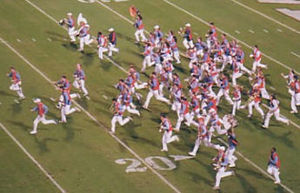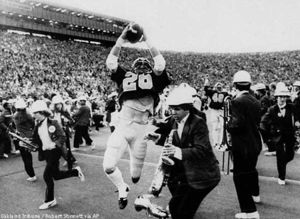Contents |
Characteristics
 The
Virginia Pep Band,
UVa's scramble band, scrambling at Scott Stadium.
The
Virginia Pep Band,
UVa's scramble band, scrambling at Scott Stadium.
Scramble bands often take pride in their diversion from the normal marching band. In fact, most scramble bands do not march at all, regardless of whether their official group name contains a form of the word "March".
Like their marching counterparts, scramble bands almost always perform music using traditional band instruments. They will also stand in formations on a field, but that is usually where the similarity between scramble bands and "normal" marching bands ends. The formations themselves are often simple shapes or crude "pictures" that lend themselves to a particular section of the performance instead of intricate geometric or abstract shapes. Additionally, scramble band performances often rely on a humorous or satirical script, read during the performance by an announcer using a loudspeaker or public address system.
Scramble bands are generally student-run and tend to be smaller in membership than what one would expect from a marching band.
According to the self-appointed "Cleverest Band in the World" at Columbia University, the origin of scramble bands is as follows:
- "See, in the 50s, our great country was going through a lot of changes. Disco was at its peak, little Shirley Temple was charming the hearts of Americans everywhere, Jesus was walking the earth, and Ronald Reagan was pushing hard for the new Women's suffrage movement. The Columbia University Marching Band, which had always been slightly wacky, took a good look at itself. "How," we asked ourselves, "could we make being in a marching band even more fun?" Well, we decided that the whole marching around and forming rhombi thing had gone out of style with World War II. So we introduced the world to the "scramble band" concept - so named for the way bandies would scramble from one interesting formation to the next."
While there is no widespread agreement as to which school actually invented the scramble band concept (The Harvard University Band, among other school bands, lays a claim), it is probably safe to assume that the process was pretty much as described.
Other characteristics of scramble bands vary by the particular group and may include:
- Non-standard instrumentation - Some bands include string or electronic sections to offer membership to musicians who would otherwise be excluded from participation in a marching band. Instruments in this category might include violins, cellos, string bass, electronic keyboards, and electric guitar. More unusual instrumentation such as bagpipes and accordions is not unheard of.
- Non-musicians - Just as membership often includes non-standard instrumentalists, it may also include people who have little or no musical talent at all. These members may "play" homemade instruments (washboards, trash can lids, mailboxes, etc.) or may participate in other various capacities.
- Skits or other dramatic performance - Members may dress in costume and/or employ the use of props (usually handmade) to mime to the audience a scene described or suggested by the announcer's script. Such scenes are often overdramatic (to aid audience members seated far away) and make use of slap-stick comedy, where appropriate (or not).
Particular ensembles
This style is practiced mainly by a number of college marching bands, primarily in more academically elite or liberal schools such as the Ivy League schools (excepting Cornell University), Stanford, the University of Virginia, and Rice.
Well-known scramble bands
Brown University Band
Columbia University Marching Band
Dartmouth College Marching Band
Harvard University Band
Michigan Technological University Huskies Pep Band
The University of Pennsylvania Band
Princeton University Band
Rice University's Marching Owl Band
Stanford University Marching Band
Virginia Pep Band
Yale Precision Marching Band
Besides school scatter bands, there are other traditional arenas for similar comic treatments of outdoor marching music &mdash, like mummers parades, the pre-Rose-Parade parody known as The Doo Dah Parade, Chinatown parades, Mardi Gras parades, etc.
Stunts and antics
Scramble bands are notorious for their irreverent stunts, and some of these prove to be controversial. The most upsetting events usually have consequences (see also: censorship) regardless of whether the band intended such controversy. Listed below are some of the more notable events in scramble band lore:
 The Stanford Band and
The Play.
The Stanford Band and
The Play.
Columbia's altar-boy joke (tuition going down faster than...) while playing a Catholic school.
UVa's Inbred Family Feud gag against West Virginia.
Stanford's band accidentally rushed the field before a game against rival Cal ended. This memorable accident, seen to the right, became known as The Play, and is often seen on highlight reels.
More recently, Stanford's band was disciplined for a show with jokes about polygamy during a game against Brigham Young University in September 2004.
Rice launched a weather balloon-based "UFO", eventually tracked by bewildered air traffic controllers.
Yale was banned from West Point after a Yale-Army halftime show in which band members formed "USA" on the field, then dropped their pants and marched off, leaving the letters spelled out in clothing.
Another Yale halftime featured the marriage of two former band members. ("At Yale, Wedding Band Takes On a New Meaning", New York Times, October 10, 1992.)
Dartmouth was banned from Holy Cross for a show that involved a Ted Kennedy Triathlon which included the "Ted Kennedy drive and swim," a parody of the Chappaquiddick affair. Members of the Kennedy family were in attendance, and needless to say, were not pleased. The Dartmouth Band was allowed back for the first time in 2004.
Occasionally, the tables are turned. The Texas A&M Aggies misinterpreted (or simply didn't like) a 1973 performance of Rice's MOB and formed an angry mob (no pun intended) outside Rice's own stadium, trapping the Owl band inside for hours until police dispersed some of the crowd and allowed the band to exit, transported by food service trucks. (The entire show can be found here[1].)
Censorship
In recent years, administrators at many schools have taken steps to rein in their scramble bands' more embarrassing attempts at humor. These have included:
- Requiring approval of show content
- Replacing student leaders with university faculty or staff
- Refusing to allow the band to perform (a step occasionally also taken by a host school during away games)
- Disbanding the band
External links
- The Dartmouth College Marching Band
- Harvard University Band
- Princeton University Band
- Yale Precision Marching Band
- The Leland Stanford Junior University Marching Band
- Michigan Tech's Huskies Pep Band
- Rice University Marching Owl Band (The MOB)
- The University of Pennsylvania Band (The Penn Band)
- The Virginia Pep Band
- The Columbia University Marching Band
Categories: Marching bands




 216.73.216.133
216.73.216.133 User Stats:
User Stats:
 Today: 0
Today: 0 Yesterday: 0
Yesterday: 0 This Month: 0
This Month: 0 This Year: 0
This Year: 0 Total Users: 117
Total Users: 117 New Members:
New Members:
 113.162.xxx.xxx
113.162.xxx.xxx
 Server Time:
Server Time: